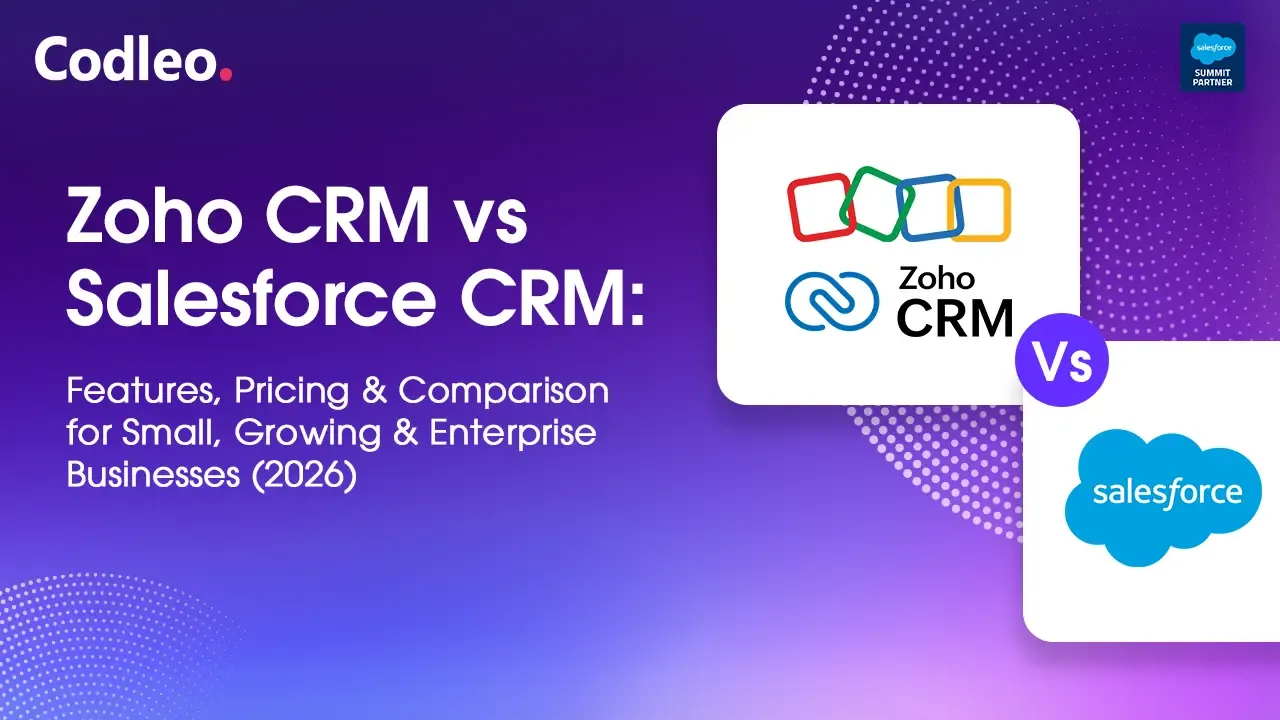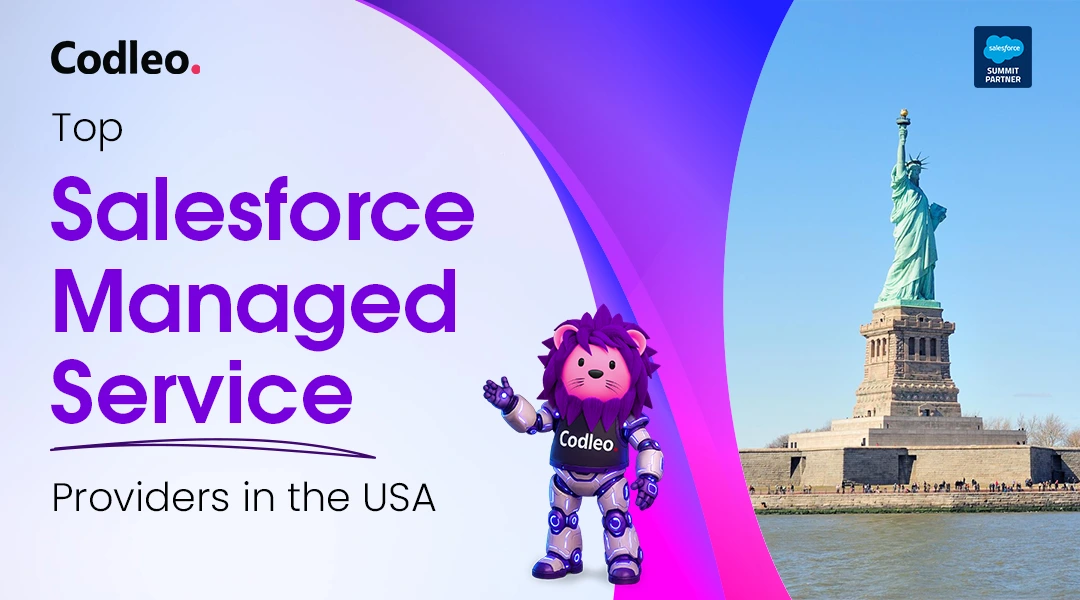
Salesforce CRM Challenges for Small Businesses

Having a strong customer relationship management (CRM) system is very important today. A good CRM helps companies work more efficiently, interact more positively with customers, and grow their business. Salesforce, as a leading CRM platform, can meet the needs of most companies.
More than 90% of Fortune 500 companies utilize Salesforce, and 73% of sales professionals have adopted it. Using Salesforce can provide significant business benefits.
This blog post is written by Salesforce experts Codleo. Their goal is to share insights about the industry and help others solve Salesforce-related problems.
In this article, you will learn about the challenges of implementing Salesforce, strategies for a successful implementation, and common scenarios that show these difficulties. You will also discover why your business needs to implement Salesforce and what the best practices are for doing so.
Why Do You Need to Implement Salesforce?
Salesforce is a platform that enables businesses to manage their customer relationships effectively. It supports sales efforts, simplifies marketing campaigns, automates tasks, and enhances customer service. This tool enables organizations to leverage data to make informed decisions and enhance efficiency.
Salesforce is crucial for enhancing teamwork and communication within organizations. It combines customer data and interactions in one place, helping different departments work together towards the same goals. This comprehensive view of customer information enables businesses to deliver personalized experiences and foster strong relationships with their customers.
Enhance your Salesforce by seamlessly integrating it with your existing systems. Explore our Salesforce Integration Services for a seamless experience.
Now, let’s look at some statistics that support the key points from the Salesforce importance infographics above:
Sales automation
A Salesforce report indicates that utilizing Salesforce Sales Cloud can increase sales revenue by an average of 37%. It can also increase sales productivity by 45% and improve forecast accuracy by 43%.
Customer service and support
A study by Nucleus Research found that companies using Salesforce Service Cloud experienced an average rise of 34% in customer satisfaction scores. The report also noted a 31% boost in agent productivity.
Analytics and Reporting
A Salesforce survey found that companies using Salesforce Einstein Analytics have seen a 48% increase in decision-making based on data. This increased understanding leads to more effective strategies and valuable insights for businesses.
Integration with third-party applications
A Forrester study found that organizations using Salesforce saw a 50% drop in IT maintenance costs. It shows that Salesforce is flexible and can adapt to changing business needs.
Salesforce Implementation Strategy: Self-Managed vs Managed
You may face a business choice: hire a Salesforce consulting partner or handle the Salesforce implementation yourself. Each option has its strengths and works better for different business needs. Let’s take a closer look at both approaches.
Managed Implementation Strategy
A consulting partner handles the entire Salesforce implementation. It includes planning, executing, and providing support after deployment. The partner takes charge of everything, ensuring a smooth integration that is customized to meet your business needs.
Pros of management implementation strategy:
-
Expertise and experience
-
Time-saving
-
Risk mitigation
-
Customization
Cons of management implementation strategy:
-
Higher cost
-
Less internal control
-
Dependency on the partner
Hybrid Implementation Strategy
Your team will work closely with a Salesforce implementation partner. This approach combines your knowledge with the partner’s skills to tailor the implementation to meet your needs while also enhancing your team’s capabilities.
Pros of hybrid implementation strategy:
-
Balanced expertise
-
Cost-effective
-
Enhanced team involvement
-
Skill development
Cons of hybrid implementation strategy:
-
Coordination required
-
Shared responsibilities
-
Potential for miscommunication
Self-Managed Implementation Strategy
Your internal team will primarily lead the project, with little support from a Salesforce partner. This approach is well-suited for businesses that possess sufficient in-house knowledge and resources to manage the implementation process.
Pros of self-managed implementation strategy:
-
Cost savings
-
Full control
-
Internal skill utilization
-
Flexibility
Cons of self-managed implementation strategy:
-
Higher risk
-
Time-intensive
-
Limited external support
-
Potential for errors
Both self-managed and partnered approaches to implementing Salesforce have their benefits, but hiring a Salesforce consultant can save you time and increase your chances of success.
A Salesforce developer offers professional guidance to ensure you follow best practices, avoid common mistakes, and customize the system to fit your specific business needs.
Salesforce Implementation Cost
The cost of implementing Salesforce can differ significantly based on several factors. These factors include the size of the organization, the complexity of the implementation, the chosen Salesforce products and features, and the level of customization required. Here are some general cost categories to keep in mind:
-
Subscription fees
-
The scope and complexity of the project
-
Number and cost of licenses
-
Number and cost of integrations
-
Data migration costs
-
CRM consulting costs
-
User training and adoption costs
-
Customization charges
-
Maintenance and ongoing costs
The costs listed are only for technical services and implementation.
If you are thinking about working with a reliable Salesforce provider to get the best results from your Salesforce implementation, keep in mind that other costs will also be affected by:
-
Size and complexity of the project
-
Type of employment
-
Technical specialization
-
Expertise and seniority
-
Industry experience
-
Location
Important: If you're planning to implement Salesforce on a budget, start by focusing on your most essential expenses. It will help you use your resources wisely and make sure you meet your key needs first.
For a budget-friendly Salesforce implementation tailored to your business, contact Codleo, and let’s explore options together.
Challenges and Risks Involved in the Salesforce Implementation Process
Implementing Salesforce is complicated. Many companies struggle with technical issues and make common mistakes during this process. Codleo is a team of Salesforce experts with experience in many implementation cases. We have seen and effectively addressed the most common challenges that arise.
Data Migration Complexities
Data migration is the process of moving data from different sources into the Salesforce platform. This can be complicated, especially if a company has a large amount of data or if the data is stored in various formats and systems.
Challenge example:
Transferring customer information into Salesforce can be challenging if a company has been using spreadsheets, outdated databases, or other legacy software. It’s essential to ensure that the data is accurate and consistent throughout this process. Common issues include duplicate records, missing data, or information that doesn't fit into Salesforce's set fields.
User Adoption Resistance
User adoption resistance is a common issue when implementing Salesforce. Employees may hesitate to use the new platform because they fear change, are unfamiliar with it, or worry about an increased workload.
Challenge example:
A sales team accustomed to traditional methods may feel overwhelmed when learning a new interface and adjusting to new processes after Salesforce is introduced. It can cause some team members to resist adopting the changes, as they may prefer their old ways of doing things.
Insufficient Planning And Scope Creep
Insufficient planning means not preparing properly before starting a project. It includes failing to set clear goals or ignoring essential stakeholders. Scope creep happens when the project’s goals expand beyond what was initially planned.
Challenge example:
A company using Salesforce for its sales process may face scope creep if the marketing team also wants to use the platform. Without careful planning and managing the project's scope, this added request can cause delays and overwhelm the project team. Delays in the sales implementation may lead to more stress for the project team.
Integration Challenges
When connecting Salesforce to other systems in an organization, integration challenges can occur. It is essential to ensure that Salesforce integrates seamlessly with these systems to maintain a smooth workflow.
Challenge example:
A company using an ERP system for inventory and financial data may struggle to connect it with Salesforce. This is because the two systems have different database structures and data formats, which makes it hard to map and sync the data.
Customization And Configuration Overload
Customization and configuration overload occur when numerous changes are made to the Salesforce platform to meet specific business needs. While Salesforce is flexible, too much customization can lead to problems.
Challenge example:
A company that heavily customizes Salesforce may struggle to maintain its smooth operation. Future updates from Salesforce may conflict with these customizations, resulting in issues and delays.
Security And Compliance Concerns
When implementing Salesforce, it’s crucial to address security and compliance issues. Businesses handle sensitive customer data and must follow data protection laws.
Challenge example:
A healthcare organization using Salesforce must follow HIPAA rules in the US to protect patient information. A financial institution may need to follow GDPR rules in Europe.
Performance And Scalability Issues
Performance and scalability issues can arise during Salesforce implementation as businesses expand and their data and user base grow.
Challenge example:
A fast-growing e-commerce company that utilizes Salesforce for customer interactions and order processing may experience slower system performance as transaction volumes increase, resulting in delays.
Inadequate Training And Knowledge Transfer
Training and sharing knowledge are crucial for a successful Salesforce implementation. If training is insufficient, it can lead to frustration, mistakes, and inefficiencies.
Challenge example:
If a sales team is not well-trained in using Salesforce for managing leads and interacting with customers, they may continue to rely on outdated methods. It will undermine the benefits of using the CRM system.
Choosing The Wrong Salesforce Edition
Choosing the right Salesforce edition is essential. Businesses can sometimes misjudge their needs, which may lead them to select an edition that doesn't meet their requirements.
Challenge example:
A small startup with a limited budget may choose a basic edition of Salesforce. However, this version may lack the features needed for long-term growth. As a result, the startup could face challenges when trying to expand its use of Salesforce.
Insufficient Testing
Failing to test thoroughly during a Salesforce setup can lead to hidden bugs, errors, or data issues. It can harm business processes and lower customer satisfaction.
Challenge example:
A sales team may encounter problems when creating quotes or processing orders if the system is set up incorrectly and this issue is not identified during the testing phase. It can cause delays and lower customer satisfaction.
Technical Difficulties in Salesforce Implementation
Customizing and integrating Salesforce with your current systems can be complicated. It often needs special skills and careful planning.
Challenge example:
Connecting Salesforce with older systems can lead to problems. Data fields may not match, or communication is difficult. To address these issues, teams will need to collaborate and undertake additional development work.
Training and Adoption Challenges
Getting employees to use Salesforce can be difficult. This is especially true because employees have different skill levels across the organization.
Challenge example:
A mixed team with varying levels of technical skills may struggle to adjust. Providing various training options, like workshops and tutorials, can help increase user adoption and build confidence in using the new system.
Budgeting and Time Management Issues
Staying on budget and on time is essential for a successful Salesforce implementation. However, unexpected costs and delays can happen.
Challenge example:
Unexpected customization needs or data migration challenges can increase costs and lead to delays. To keep the project on schedule, effective planning, risk assessment, and project management are vital.
Best Practices For Salesforce Implementation Process
The list of challenges is quite long. Now is the perfect time to discuss the steps a business can take to prevent problems and ensure a successful rollout. Here are three essential tips to help with a smooth and effective implementation.
#1 Strengthening Teams Relationships.
While the benefits of quicker processes, higher productivity, and better customer relationships are appealing, organizations often face challenges that can derail their plans. With good communication, careful planning, teamwork, and strong relationships among team members, organizations can overcome these challenges and succeed in their Salesforce implementations.
Creating teams with members from different functions who work toward a common goal is essential. Building a culture of trust, teamwork, and open communication enables teams to manage the challenges of Salesforce implementations better. When team members feel free to share their ideas, voice their concerns, and celebrate achievements, the implementation process becomes stronger and more flexible.
#2 Multi-Step Project Planning
Based on our experience, you can simplify effective project planning for a Salesforce implementation into five main steps:
-
Comprehensive planning: Begin by assessing your organization's needs. Set clear objectives and create a detailed plan. It will help reduce risks, identify potential challenges, and establish realistic timelines. Work closely with stakeholders to ensure that all business requirements match the overall strategic goals.
-
Effective communication: Maintain clear and open communication among all parties involved—executives, project managers, developers, and end-users. Share regular updates, hold status meetings, and create open channels for feedback. It helps everyone stay aligned on goals, manage expectations, and quickly handle any concerns, promoting a culture of collaboration and accountability.
-
Agile approach: Utilizing an agile approach enables teams to respond rapidly to changing requirements. It allows for development in small steps and delivers value incrementally. Break the project into smaller parts, called sprints, to keep the project moving forward. This way, you can make adjustments when needed and continuously improve the results for better outcomes.
-
Training and enablement: Train all users, including administrators and end-users, on how to use Salesforce effectively. Ongoing support and resources will help users feel confident and engaged, which can prevent problems after implementation.
-
Post-implementation review and optimization: After the initial rollout, review the project to see how well it met its goals. Find areas that need improvement and make any necessary adjustments. Keeping it updated ensures that the Salesforce implementation continues to meet business needs and provides ongoing value.
#3 Collaborating with Stakeholders
Working well with stakeholders is key to a project's success. Each stakeholder plays a crucial role in shaping the project and its outcomes. By involving stakeholders early and regularly, organizations can leverage their expertise, gather valuable feedback, and address problems before they escalate into larger issues. This strategy fosters a sense of ownership and commitment among stakeholders, which helps ensure the project is adopted and executed successfully.
At Codleo, successful Salesforce projects depend on teamwork. We support cross-functional teams with different skills, open communication, and mutual respect. This approach enables us to tackle challenges and achieve outstanding results.
Here are some key strategies to help you implement Salesforce CRM. While there are many details to consider, these steps will guide you through the basic process.
Salesforce Implementation in the Era of AI
Artificial intelligence (AI) is changing how businesses work, and Salesforce is leading this change. In the future, we will see more AI features and abilities added to the Salesforce platform.
Imagine a world where Salesforce analyzes customer data in real-time and gives personalized product recommendations based on what each person likes. With AI, businesses can automate repetitive tasks like data entry and lead qualification. This saves time for sales teams, allowing them to focus on building relationships and closing deals.
AI chatbots will play a key role in customer service for Salesforce. These chatbots can understand customer questions and provide prompt support, resulting in increased customer satisfaction. With AI, Salesforce will become smarter, more efficient, and better focused on meeting the needs of its customers.
The Impact of Cloud Computing on Salesforce Implementation
Cloud computing has significantly transformed how businesses utilize Salesforce. It enables them to leverage the cloud for improved storage, enhanced scalability, and increased flexibility.
One major benefit of cloud computing is the ability to set up quickly. With the cloud, businesses can easily create and configure Salesforce accounts, which saves time and effort during implementation. This flexibility helps organizations adapt to market changes and stay competitive.
Also, cloud computing improves data security when using Salesforce. Cloud providers invest significantly in robust security measures to safeguard customer data from unauthorized access and data breaches. This level of security gives businesses confidence, knowing their essential data is safe.
Cloud computing enables businesses to easily scale their Salesforce setups as their needs evolve. Companies can quickly add new users, connect with other systems, or expand into new markets. The cloud offers the flexibility to do this without needing to invest heavily in infrastructure.
Data migration can be tough. Let us take care of it with our effective methods and expert help. Check out our Salesforce Migration Services to make your move smooth.
In this blog post, we will share a real-life story about a mid-sized company implementing Salesforce.
-
Case objective: The customer asked for custom analytic components to better unify customer data and improve sales and service processes.
-
Case challenges: The team faced unexpected problems despite careful planning and involving stakeholders. One issue was data migration, which included problems with different data formats and quality. Also, while users were excited during the initial training sessions, keeping their interest over time needed ongoing support and encouragement.
-
Solutions to challenges: We fixed data migration problems through thorough cleaning and validation. We also worked proactively and teamed up with experts to solve long-term support issues.
Final Take
Salesforce implementation can be challenging. However, with careful planning, teamwork, and expert help, businesses can overcome these challenges. By following best practices and keeping up with trends like AI and cloud computing, companies can get the most out of Salesforce. This helps them grow and improve customer relationships. To have a smooth implementation experience, consider working with trusted Salesforce experts.
Many businesses benefit from hiring Salesforce implementation services. Working with experienced Salesforce development companies can provide better value for your investment. Consider Codleo as your trusted partner for Salesforce implementation or any related project. With over 8 years of experience and more than 1,000 successful projects, we are fully equipped to manage Salesforce implementations of any complexity.
Contact Codleo today to discuss how we can help your business!
Looking for a trusted Salesforce implementation partner in the USA? Codleo brings expertise, experience, and a proven track record to transform your business.
Read Also: How to Choose the Right Salesforce Partner for Your USA
Latest Blog
Say "hello" to us and lets gets talking
Partner with the best team in the world for your CRM or other digital needs.
Contact Us




